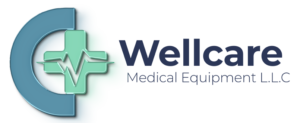Mindray Hematology Supplier in Dubai: Well Care Medical Equipment LLC
Well Care Medical Equipment LLC stands as a trusted and prominent supplier of Mindray Hematology products in Dubai, offering cutting-edge medical solutions that cater to the diagnostic and healthcare needs of hospitals, clinics, and laboratories across the region. Mindray, a global leader in medical devices, is renowned for its advanced technology in hematology analyzers, and Well Care Medical Equipment LLC plays a pivotal role in distributing these innovative solutions to healthcare providers in Dubai and the wider UAE. With a focus on high-quality medical equipment, Well Care Medical Equipment LLC provides a comprehensive range of Mindray hematology instruments, including hematology analyzers and blood cell counters. These devices are integral in providing accurate and timely diagnostic results, essential for the effective management of various blood-related conditions. Mindray's hematology products are known for their precision, ease of use, and reliability, making them a crucial component in modern medical diagnostics. What sets Well Care Medical Equipment LLC apart is their commitment to not only providing top-of-the-line Mindray hematology analyzers but also offering expert installation, training, and after-sales support. This ensures that healthcare professionals can seamlessly integrate these advanced systems into their workflows, enabling better patient care. The company’s dedication to service excellence means that clients in Dubai and across the UAE receive ongoing support, ensuring that the equipment remains in optimal working condition. Well Care Medical Equipment LLC’s reputation as a leading Mindray supplier is built on their deep understanding of the healthcare sector’s needs, combined with their ability to offer cutting-edge solutions. Their partnership with Mindray enhances the ability of medical facilities to perform routine blood tests and more complex analyses with ease, accuracy, and efficiency, contributing to improved patient outcomes. As the demand for advanced hematology testing continues to rise, Well Care Medical Equipment LLC remains a key partner for those seeking reliable, high-performance diagnostic equipment in Dubai. Their range of Mindray hematology systems is designed to meet the ever-evolving needs of the medical industry, ensuring healthcare providers can deliver the best possible care.
Relevance of Mindray Hematology in Modern Healthcare
Mindray Hematology products play a vital role in modern healthcare by providing accurate, efficient, and reliable blood analysis solutions. Hematology analyzers from Mindray are crucial in diagnosing and monitoring a wide range of blood-related conditions, including anemia, infections, and blood cancers. The precision and advanced technology embedded in Mindray’s equipment allow healthcare professionals to obtain rapid and detailed results, enabling them to make informed decisions regarding patient care.
In regions like Dubai and the UAE, where healthcare standards are continually advancing, Mindray Hematology solutions offer high-throughput capabilities, essential for busy laboratories and hospitals that handle large volumes of blood samples. These devices are not only user-friendly but also designed to streamline workflows, improve diagnostic accuracy, and reduce the chances of human error, ensuring consistent and dependable results.
Furthermore, Mindray’s hematology analyzers are highly relevant in promoting patient safety and clinical efficiency. The devices incorporate features like automated counting, differential blood cell analysis, and enhanced data management systems, which help reduce manual labor, cut down testing times, and improve overall patient care outcomes. As the demand for high-quality diagnostic services grows, Mindray Hematology’s contribution to diagnostics becomes increasingly indispensable in helping healthcare providers in the UAE and around the world deliver optimal care.
Types of Mindray Hematology Analyzers
Mindray offers a wide range of hematology analyzers designed to meet the needs of various healthcare settings, from small clinics to large hospitals and laboratories. These devices are essential in performing accurate and efficient blood tests for diagnosing blood disorders. Below are some of the key types of Mindray hematology analyzers:
1. Automated Hematology Analyzers
These are the most common type of Mindray hematology instruments used for routine blood testing. They automate the process of blood cell counting, classification, and analysis, delivering rapid and accurate results. Key models include:
- BC-5000 Series: Ideal for small to medium-sized laboratories, providing comprehensive blood analysis with high accuracy and ease of use.
- BC-6800: A high-throughput, 5-part differential analyzer designed for large laboratories, offering advanced features like automatic reagents and sample management.
- BC-6200: Designed for both small and mid-sized labs, this model provides quick analysis with results that meet the standards for clinical hematology.
2. Semi-Automated Hematology Analyzers
Semi-automated analyzers are suitable for smaller clinics or laboratories with lower volumes of samples. These systems require some manual intervention but offer excellent performance for routine testing. A popular model is:
- BC-2300: This analyzer provides a cost-effective option for blood cell counting, suitable for labs that require fewer tests but still demand high-quality results.
3. Advanced Hematology Analyzers (High-Throughput)
For large clinical settings or hospitals with high patient volumes, advanced hematology analyzers from Mindray are designed for high throughput and complex analysis. These systems provide detailed reports on various blood parameters and are equipped with cutting-edge technology for automation and reliability.
- MS-9: A high-end, 5-part differential hematology analyzer, suitable for large hospitals and diagnostic centers, known for its rapid processing and comprehensive analysis.
4. Coagulation Analyzers
These are specialized instruments used for analyzing blood coagulation. They play a crucial role in diagnosing bleeding disorders like hemophilia or clotting problems. Mindray’s coagulation analyzers include:
BC-1000: While this system is more focused on hematology, it includes testing capabilities for coagulation factors, essential for diagnosing clotting disorders.
5. Reticulocyte Analyzers
Mindray also offers reticulocyte analyzers, which are specialized instruments used to measure immature red blood cells, which are crucial in diagnosing anemia and other blood conditions. This tool provides an accurate count of reticulocytes in the blood, offering vital information for patients with chronic anemia or bone marrow diseases.
6. Point-of-Care Hematology Analyzers
These are portable, easy-to-use analyzers suitable for emergency situations or small clinics. They offer quick results, typically focusing on essential parameters like red blood cell count, white blood cell count, and hemoglobin levels. While these are less common, Mindray provides such options for immediate diagnostic needs in remote or emergency settings.
Well Care Medical Equipment LLC is a leading supplier of Mindray Hematology products in Dubai, offering a comprehensive range of advanced hematology analyzers for healthcare providers across the UAE. Mindray’s cutting-edge technology ensures accurate and efficient blood testing, essential for diagnosing a wide variety of blood-related conditions. With products designed for both small clinics and large hospitals, Well Care provides expert support, ensuring seamless integration and optimal performance. By offering high-quality hematology solutions, Well Care Medical Equipment LLC plays a crucial role in enhancing diagnostic capabilities and improving patient care outcomes in the region.




